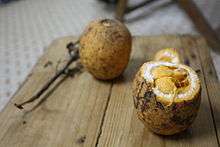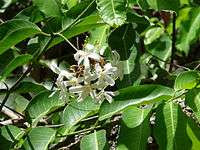Saba senegalensis
| Saba senegalensis | |
|---|---|
 | |
| S. senegalensis | |
| Scientific classification | |
| Kingdom: | Plantae |
| (unranked): | Angiosperms |
| (unranked): | Magnoliids |
| Order: | Gentianales |
| Family: | Apocynaceae |
| Genus: | Saba |
| Species: | S. senegalensis |
| Binomial name | |
| Saba senegalensis (A.DC.) Pichon | |
Saba senegalensis (Bambara: Nsaban or Zaban; English: Senegal saba; French (from a Pulaar bastardization): liane saba; Wolof: mad or madd or "kabaa" in Gambian Wolof; Pulaar: laare) is a shrub-like fruit tree of the Apocynaceae[1] family, native to the Sahel region of sub-Saharan Africa. The tree grows predominantly on riverbanks and in woodlands.[2] ICRISAT has cited S. senegalensis as a useful food crop plant and as a tool to combat soil degradation in rural Africa.[3]

S. senegalensis flowers
References
- ↑ "Plants Profile for Saba senegalensis (Senegal saba)". Plants.usda.gov. Retrieved 2013-10-15.
- ↑ Burkill, HM. "A tree species reference and selection guide". PROSEA. Retrieved 15 May 2013.
- ↑ "Transforming Agriculture in the Sahel Through Tree-Crop-Livestock Systems" (PDF). Icrisat.org. Retrieved 2013-10-15.
External links
This article is issued from Wikipedia - version of the 4/2/2016. The text is available under the Creative Commons Attribution/Share Alike but additional terms may apply for the media files.